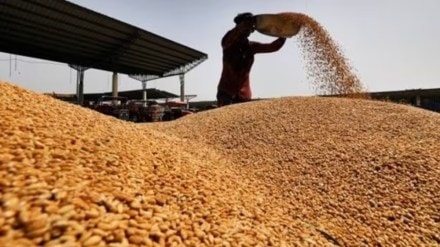India has put forward the condition of finding a permanent solution to the issue of public stockholding of food grains at the World Trade Organisation (WTO) before negotiations on agriculture can move to other issues of export restrictions and domestic support to the farm sector, a senior official said.
At the WTO Mini-ministerial on meeting on agriculture which was held virtually on India’s call late last night, Minister of Commerce and Industry Piyush Goyal put forward New Delhi’s approach to the issue saying that public procurement and shockholding of food grains serves the twin objective of food security and income support.
“India has made it clear that no new issue in the agri sector can be discussed in the WTO before finding a permanent solution to a mandated issue of the public stockholding,” the government official, who did not wish to be named, said.
The Cairns Group of agricultural exporting countries which has 19 members including Argentina, Australia, Brazil, Canada, Chile and Colombia have been seeking to curb domestic support that India provides. According to them the procurement at fixed prices and public stock of grains distorts markets. As minimum support price acts as a price barometer for Indian rice and wheat for exports it keeps their global prices suppressed. At the mini-ministerial Cairns group has the backing of some other countries on the issue taking their total to 28.
They are also of the view that public stocks also reduce opportunity for them in the local market.
India also reiterated that its MSP and public distribution programmes keeps global agri prices stable. India’s food grain production is 330 million tonnes and if even 10% of that demand comes to the global trade it will destabilise the markets and lead to prices shooting up,
According to the Food and Agriculture Organisation of the United Nations the global trade in cereals in 2023-24 is expected to be 460 million tonnes.
It also pointed out that the public stockholding helped it weather the COVID crisis and the country was able to feed its population during long lockdowns.
India’s view on public stocking holding and procurement at government-set prices has the backing of other developing countries.
The net food importers like Japan, Egypt want curbs on food exports that some countries impose as it impacts their food security. Some members, mostly developing economies including India, stress that export restrictions are a useful policy tool to address domestic food insecurity, and that the effects of export restrictions on global food security should be considered in a broader context.
Cairns group also has an interest in curbing the powers of the countries to impose export restrictions on food as they say that it is market distorting.
At the 13th Ministerial Conference at Abu Dhabi in February next year India will be reiterating its stand for finding a permanent solution to the issues of public stockholding and procurement at government-set prices.
These issues have been hotly debated at the WTO and after years of back and forth on the issues, at the WTO Ministerial Meeting at Bali 2013 ‘peace clause’ was agreed to but with conditions that governments making use of it have to avoid trade distorting subsidies and to provide information on how they are meeting the conditions.
The peace clause also ensured that the public procurement programmes could not be challenged at the WTO. India wants the peace clause, which was an interim measure but with no end date, to be made permanent.
As part of a permanent solution, India has asked for amendments in the formula to calculate the food subsidy cap and inclusion of programmes implemented after 2013 under the ambit of ‘Peace Clause’. For calculation of limits of support that can be offered prices of 1986-1988 are taken as base and then adjusted for inflation. India is also asking for a change in it.
Under global trade norms, a WTO member country’s food subsidy bill should not breach the limit of 10% of the value of production based on the reference price of 1986-88. Subsidies over and above the prescribed ceiling are seen as trade distorting.
In rice India’s support exceeds the 10% cap and some countries say that it has helped it become one of the top rice exporters. India’s stand has been that it exports premium rice varieties which are not part of public procurement.
